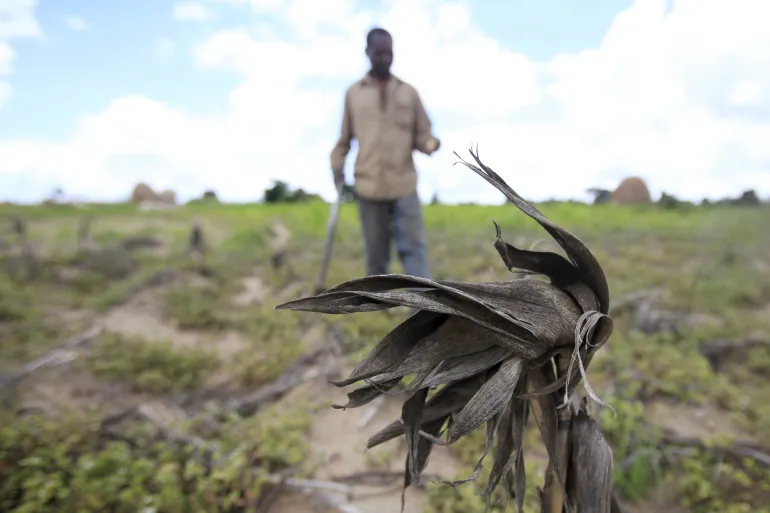It didn’t come as a surprise when President Emmerson Mnangagwa declared Zimbabwe’s drought a national disaster after neighbouring Zambia and Malawi, did the same. The drought, linked to the El Niño climate phenomenon has scorched crops, leaving millions of people in need of food aid and assistance.
During the declaration, Mnangagwa disclosed that almost 3 million will go hungry this year after the alteration of wind patterns induced the drought that has hit virtually all across the country.
Southern Africa has reached crisis levels with Botswana and Angola to the west, and Mozambique and Madagascar to the east also facing hunger.
Most provinces in Zimbabwe have experienced crop failure since last November, with hotter areas having to write off grains such as maize
A Mother of four Laiwa Musenza is already heavily dependent on a local Non-Governmental Organisation (NGO) to feed her family and the crisis is only just starting.

“Imagine hearing your children crying from hunger when you cannot do anything about it,” the 54-year-old said.
At a farm on the outskirts of Harare, there are queues of children and the elderly who line up to receive small portions of macaroni and soybean stew in what may be their only meal of the day.
In the agricultural commune of Karibone where residents work on farms in neighbouring farms, the drought has left them jobless and hungry.
“We could only manage one meal per day. For those of us with young children it was particularly tough,” Musenza, a resident told AFP.
A makeshift feeding station run by Samantha Muzoroki, has strived to provide two meals to an average of 1,500 children a day at its five kitchens, but Muzoroki fears that her organisation may be overwhelmed as the drought continues.
“Our movement is donor-driven. We have had a huge dip in donations. We are receiving $400 every three months, down from $600 which is way below half of our budget,” Muzoroki said.
“We try to make sure that every day everyone we cater for can get at least a meal a day if we fail to give them two meals.
“The drought is definitely going to affect us in many ways and I hope and pray that it doesn’t lead us to closing any of our centres.”

In Epworth, a settlement east of the capital, families have to skip meals, while children are miss school as families struggle to get food.
“We are having two meals a day instead of three,” said Letwin Mhande, a 36-year-old mother of four, whose fruit and vegetable store is struggling to find stock and customers.
“We eat once at midday and once before going to bed, sometimes we don’t have food to give the children and they miss school.”
President Emmerson Mnangagwa says the country needs at least 2 billion dollars to fight the drought. At least 7.6 million people, almost half of the population, need aid.
The United Nations has appealed for $429.3 million to help people affected by the drought.
UNICEF also launched an urgent $84.9-million appeal last month “to provide lifesaving interventions amidst a complex humanitarian crisis exacerbated by water and food shortages”.


